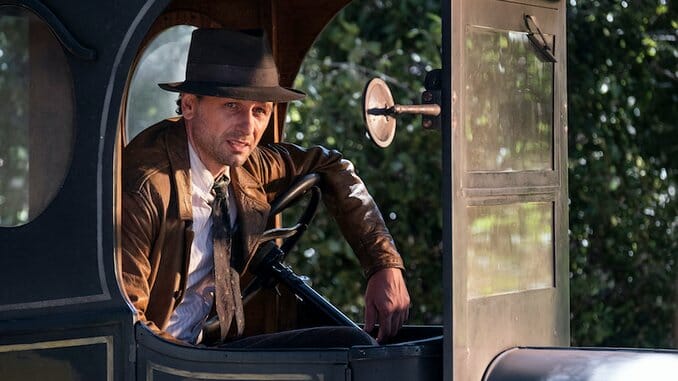Let Us Now Damn HBO’s Perry Mason with Faint Praise
Photo Courtesy of HBO
How often does the strength of a detective show depend not on the potency or even plausibility of the story, but on the dual elements of performance and atmosphere? A show like the first season of True Detective draws you in instantly, and the plot is no more than a small part of the formula. It’s the interplay of Rust Cohle and Marty Hart, the ominous, unsettling weight of neo-Gothic Louisiana, that captures you. If it failed on those merits, the story would never matter.
But what are we dealing with here? Well, if you’re like me, you assumed that HBO’s Perry Mason was a kind of “remake” that had something to do with the original Perry Mason series, a late ‘50s, early ‘60s courtroom drama starring Raymond Burr. In fact, the new version has almost nothing to do with that show, beyond sharing a city. This is supposedly an “origin story” of sorts, showing Mason before he became a criminal defense lawyer, and we see him instead as a down-and-out private investigator with egg on his tie and a case of WWI PTSD. This is apparently more in keeping with the character as written originally by Erle Stanley Gardner, and I’m sure the remainder of the eight episode season will see him transform into something like the redoubtable attorney. But the fact is that the overwhelming majority of TV viewers will associate the character with Burr, which makes the whole thing is confusing from the jump.
Once you get over that initial complication, you’ll have to wade through a murky plot. There’s a dead baby, grotesque sexual acts involving food that would only be appealing to George Costanza, and a morgue that doubles as a secondhand clothing shop. When the mystery emerges, it’s equally average. The kidnapping, ransom, and eventual murder of a child are the lynchpins, but are also connections to crooked police, a mega-church, and a series of affairs and adoptions that may implicate the parents.
Calling Perry Mason a tepid success is a wavering so-so hand pointed in the general direction of the ‘30s-era Los Angeles set, which feels more theatrical than real, and the presence of Matthew Rhys as the down-and-out private investigator Mason. Both are fine, and at times Rhys is excellent, but it’s never convincing enough to let you disappear into the story. Even when Rhys is at his best, others let him down, including Tatiana Maslany, who is terrific as a preacher in every scene except the ones where she actually preaches. There, she falls flat, and the performance contains traces of desperation; the writers want you to believe she’s a rising star in what passes for the L.A. mega-church evangelical milieu, but she never quite seems believable.
I don’t know if the story is any good now, but as hinted above, I don’t think it matters. The interactions, the stakes, even the supporting actors like John Lithgow, Gayle Rankin, Eric Lange, and Chris Chalk, while their performances are solid, don’t seem important. While it would be too dramatic to call this show a failure, the fact that it’s not better marks a subtle kind of failure, and one that can’t really be overcome.